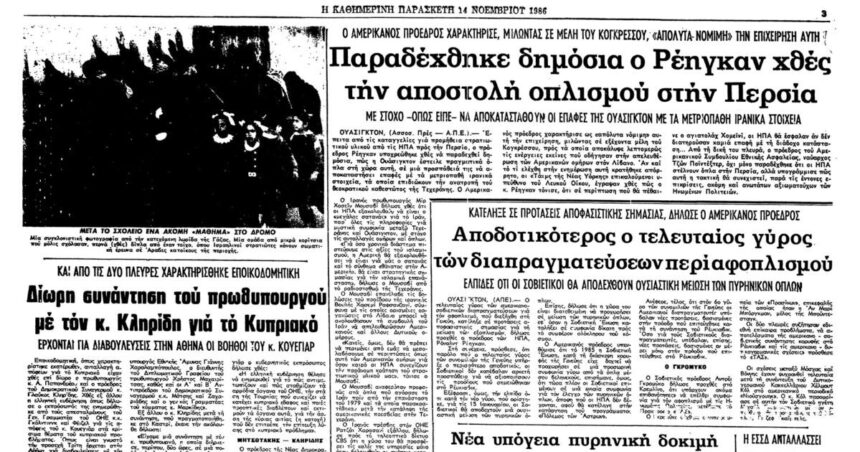During the Cold War, the US was faced with two problems: the threat of the spread of communism and terrorism in the Middle East. Their commitment to these two goals was to create, among other things, the biggest scandal of Ronald Reagan’s presidency, known as the “Iran-Contra Affair.”
Before Reagan even took office, in November 1979, armed Iranian students, supporters of Ayatollah Khomeini, seized the American embassy in Tehran and took 54 American diplomats and officials hostage. At the legislative level, then-President Jimmy Carter, with his presidential decree, banned the sale of arms to Iran and imposed a general embargo. This move made Iran’s position difficult, especially since it was embroiled in a war with Iraq in 1980 (which would end in 1988).
But it took 444 days for the last hostages to be freed, the day Reagan took office. Thus, the new president made managing the tense situation in the Middle East a priority. In 1984, however, in his second term, the then-emerging Hezbollah (Islamic paramilitary and political organization of Lebanon), kidnaps the head of the CIA station in Beirut, William Buckley; six more kidnappings of Americans by the same organization will follow. Its purpose was to discourage the US from getting involved in the Lebanese civil war.
The new model of terrorism was a challenge that the American president was called upon to face effectively and decisively. And while publicly stating that the US government would not negotiate with terrorists, he turned to his National Security Adviser, Robert McFarlane, asking for a solution to the hostage issue. McFarlane drew up an unorthodox plan: the US would sell secret weapons to Iran in exchange for the latter’s mediation with Hezbollah to release the hostages.
With Reagan’s approval, the plan was put into place, and beginning in August 1985, the US began supplying Iran with weapons. By the end of October 1986, Iran had received more than 2,000 anti-tank missiles as well as components for HAWK anti-aircraft missiles. However, the results of this risky – and illegal – operation were disappointing: Hezbollah had released only three hostages: a Catholic priest, a Presbyterian missionary and a hospital administrator, while immediately capturing three more hostages. At the end of 1987, seven Americans were still in custody in Lebanon.
That all changed on November 3, 1986, when the weekly Lebanese magazine Ash-Shiraa revealed that in May 1986, McFarlane and Lt. Col. Oliver North personally traveled to Tehran to inspect the arms-buying operation. Little by little, the tangle unraveled, and despite the efforts of those in charge to cover it up, the Reagan administration’s larger plan to exchange arms for hostages was soon revealed.
On November 13, President Reagan admitted to Congress that the US was sending arms to Iran, denying that this was in exchange for the release of hostages, but asserting that the purpose of the operation was to restore Washington’s contacts with moderate Iranian elements.
“Although what was said in this briefing was kept secret,” Kathimerini wrote the next day, “the New York Times, quoting a White House official, wrote yesterday that Mr. Reagan emphasized that if he were to die Ayatollah Khomeini, the US would be wrong not to maintain any contact with the successor state… For his part, the chairman of the US National Security Council, Admiral John Poindexter, not only admitted that the US is sending weapons to Persia, but emphasized that this tactic will continue, despite strong criticism, even from top United States officials.” (Indeed, the secretaries of State and Defense, George Shultz and Caspar Weinberger, were opposed to this venture.)
Despite the outcry caused by the outbreak of this scandal, the crisis for the Reagan administration was far from over, it was just beginning. Almost a month before the Ash-Shiraa revelation, on October 5, 1986, an American plane crashed in Nicaragua. The sole survivor, an American marine, was captured by the forces of the left-wing Sandinista government there. The revelation about the cargo he was carrying would further complicate matters for the Reagan administration and link two seemingly unrelated US government illegal operations.
The US history with Nicaragua begins a few years ago. In 1979, the Sandinistas overthrew dictator Anastasio Somoza Debayle and installed a revolutionary government. US reflexes couldn’t help but kick in. Thus, in 1981, President Reagan authorized a CIA operation in which the latter would provide material support to Nicaragua’s anti-government right-wing rebels, also known as the Contras.
On November 8, 1982, an article in Newsweek magazine exposed the CIA’s illegal support to the Contras. This caught the attention of Democratic lawmaker Edward Boland, chairman of the House Intelligence Committee, as the US president was required to inform both the House and Senate intelligence committees of such covert operations, but the Reagan administration had completely bypassed Congress in approving CIA activity. Thus, Boland secured bipartisan approval of the so-called “Boland Amendment,” which specifically prohibited financial and military support “for the purpose of overthrowing the government of Nicaragua.”
Despite the limitations of the Boland Amendment and at the urging of President Reagan, who considered the Contras “freedom fighters” who were “the moral equivalent of our Founding Fathers,” the CIA continued its operations in Nicaragua, mining three of its ports in early 1984, resulting in the destruction of 9 ships, the death of two and the injury of 15 people. Congress learned of this CIA action from the newspapers and outraged, lawmakers reacted immediately by passing the “Second Boland Amendment,” which prohibited the CIA and any other government agency “engaged in intelligence gathering activities” from using federal funds to support “military or paramilitary operations in Nicaragua.”
But even that did not stop the Reagan administration, which ruled that the National Security Council was not an intelligence agency, so the amendment could not curtail its activities, which not only continued, but intensified. As part of those activities, the plane that crashed in Nicaragua was carrying war material to the Contras.
When the scandal with the arms sales to Iran was revealed, through the related investigation of the Ministry of Justice, a memorandum was also found that North had written to Admiral Poindexter, explaining how the proceeds of the arms sales to Iran were sent to a Swiss bank account and was used to buy supplies for the Contras.
Thus, the two major scandals of the time were directly linked, tarnishing President Reagan’s foreign policy, but also endangering his very position, with many questioning whether he was fit to carry out his presidential duties. In a televised speech on March 4, 1987, Reagan retracted his earlier statements and told the truth about the arms sales but claimed he did not know the money was going to the Contras, while accepting the resignations of his officials.
Ultimately, despite the criminal charges brought, all the accused were either acquitted or received a presidential pardon by President Bush (Vice President in the Reagan administrations). However, the reputation of Ronald Reagan, who was at the helm of America throughout the 1980s, seems not to have suffered, as a few months after the crisis, the American people seemed ready to forgive – or forget – him.
Column editor: Myrto Katsigera, Vassilis Minakakis, Antigoni-Despina Poimenidou, Athanasios Syroplakis




